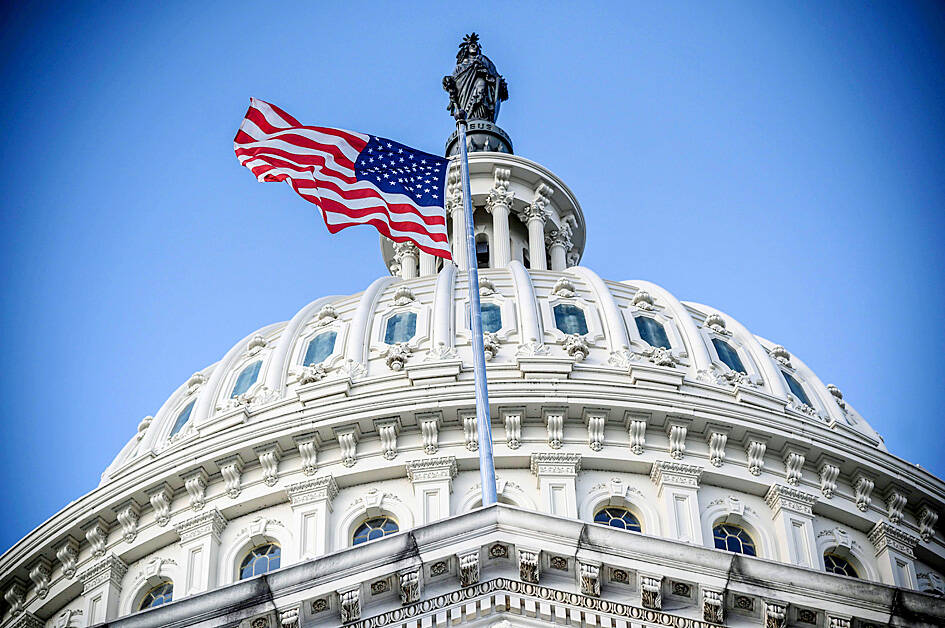The US Senate Committee on Foreign Relations is on Wednesday to deliberate on the Taiwan Policy Act of 2022.
The deliberations were originally scheduled to take place on July 9, but were postponed to Sept. 3 after some Republican senators requested more time to study the bill. It was further postponed as the US Senate first handled Finland’s and Sweden’s NATO membership applications.
Robert Sutter, a professor of international affairs at George Washington University, in an article published in The Diplomat on Saturday said that bipartisan majorities in both chambers of the US Congress indicate support for Taiwan.

Photo: AFP
“Supporting Taiwan as an important partner in dealing with these challenges [from China] remains a high priority,” he wrote.
China increased military exercises around Taiwan after US House of Representatives Speaker Nancy Pelosi visited Taipei early last month.
However, that did not deter further US congressional visits to Taipei or efforts by the administration of US President Joe Biden to foster closer ties with Taiwan, he wrote.
The bill calls for “more symbolic moves in the legislation,” such as renaming Taiwan’s de facto embassy in Washington from the “Taipei Economic and Cultural Representative Office” to the “Taiwan Representative Office,” Newsweek reported on Thursday.
It also proposes changing the title “American Institute in Taiwan [AIT] director” to “AIT representative,” the appointment of which would require Senate confirmation similar to ambassadorial appointments.
The US might also designate Taiwan a “major non-NATO ally,” as it has done for Australia, Israel, Japan and South Korea, to facilitate arms sales, the magazine reported.
Although some elements of the bill might be discarded, the US is “unlikely to halt future debate” on its Taiwan policies, as China has been increasing pressure on Taiwan, Newsweek reported.
US National Security Adviser Jake Sullivan has told reporters that “some of the contents [of the bill] made us worried.”
Kuo Yu-jen (郭育仁), a professor at National Sun Yat-sen University’s Institute of China and Asia-Pacific Studies, on Saturday said that the US Congress appears to be seeking “pre-emptive preparedness” with the bill.
Each Taiwan-friendly act the US passes would serve as a legal basis for its administration to formulate policies, most of which are “compliant with the baseline,” he said.
It is therefore reasonable for Sullivan to worry about the bill, as some of its provisions might exceed the baseline established in the past, he added.
The US executive branch might be concerned that the bill would prompt China to take an even stronger stance against Taiwan in the “overall strategy for resolving the Taiwan dilemma in the new era,” which China plans to propose during the 20th National Congress of the Chinese Communist Party next month, he said.
However, it is because of Beijing’s tough measures that the US Congress proposed the bill, which seeks to bolster US strategies according to changes in the relationship between the US, Taiwan and China, he said.

DAREDEVIL: Honnold said it had always been a dream of his to climb Taipei 101, while a Netflix producer said the skyscraper was ‘a real icon of this country’ US climber Alex Honnold yesterday took on Taiwan’s tallest building, becoming the first person to scale Taipei 101 without a rope, harness or safety net. Hundreds of spectators gathered at the base of the 101-story skyscraper to watch Honnold, 40, embark on his daredevil feat, which was also broadcast live on Netflix. Dressed in a red T-shirt and yellow custom-made climbing shoes, Honnold swiftly moved up the southeast face of the glass and steel building. At one point, he stepped onto a platform midway up to wave down at fans and onlookers who were taking photos. People watching from inside

A Vietnamese migrant worker yesterday won NT$12 million (US$379,627) on a Lunar New Year scratch card in Kaohsiung as part of Taiwan Lottery Co’s (台灣彩券) “NT$12 Million Grand Fortune” (1200萬大吉利) game. The man was the first top-prize winner of the new game launched on Jan. 6 to mark the Lunar New Year. Three Vietnamese migrant workers visited a Taiwan Lottery shop on Xinyue Street in Kaohsiung’s Gangshan District (崗山), a store representative said. The player bought multiple tickets and, after winning nothing, held the final lottery ticket in one hand and rubbed the store’s statue of the Maitreya Buddha’s belly with the other,

‘NATO-PLUS’: ‘Our strategic partners in the Indo-Pacific are facing increasing aggression by the Chinese Communist Party,’ US Representative Rob Wittman said The US House of Representatives on Monday released its version of the Consolidated Appropriations Act, which includes US$1.15 billion to support security cooperation with Taiwan. The omnibus act, covering US$1.2 trillion of spending, allocates US$1 billion for the Taiwan Security Cooperation Initiative, as well as US$150 million for the replacement of defense articles and reimbursement of defense services provided to Taiwan. The fund allocations were based on the US National Defense Authorization Act for fiscal 2026 that was passed by the US Congress last month and authorized up to US$1 billion to the US Defense Security Cooperation Agency in support of the

‘COMMITTED TO DETERRENCE’: Washington would stand by its allies, but it can only help as much as countries help themselves, Raymond Greene said The US is committed to deterrence in the first island chain, but it should not bear the burden alone, as “freedom is not free,” American Institute in Taiwan Director Raymond Greene said in a speech at the Institute for National Defense and Security Research’s “Strengthening Resilience: Defense as the Engine of Development” seminar in Taipei yesterday. In the speech, titled “Investing Together and a Secure and Prosperous Future,” Greene highlighted the contributions of US President Donald Trump’s administration to Taiwan’s defense efforts, including the establishment of supply chains for drones and autonomous systems, offers of security assistance and the expansion of